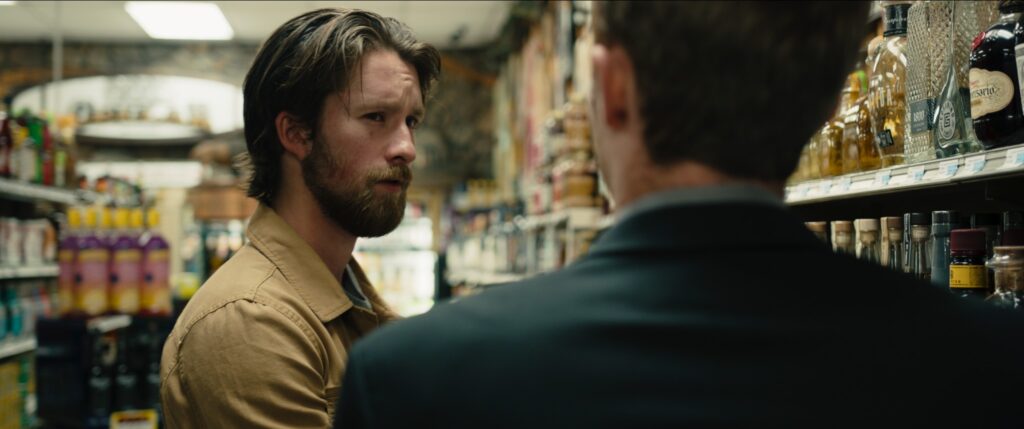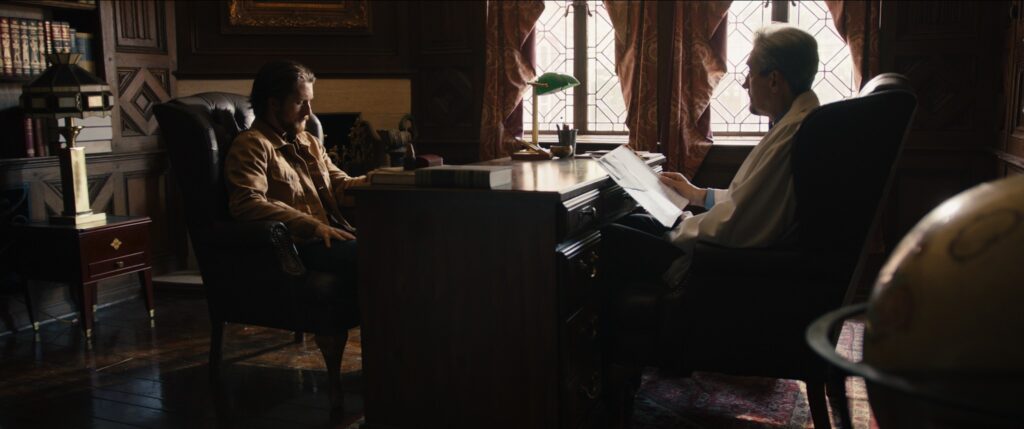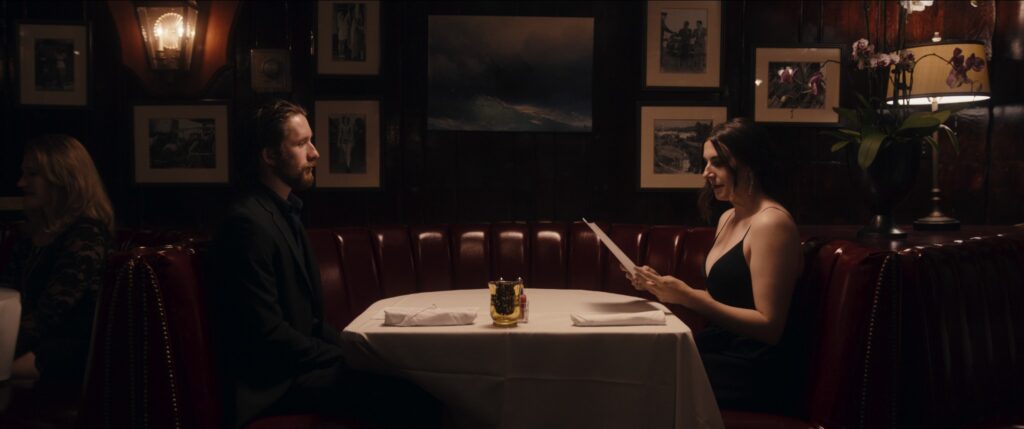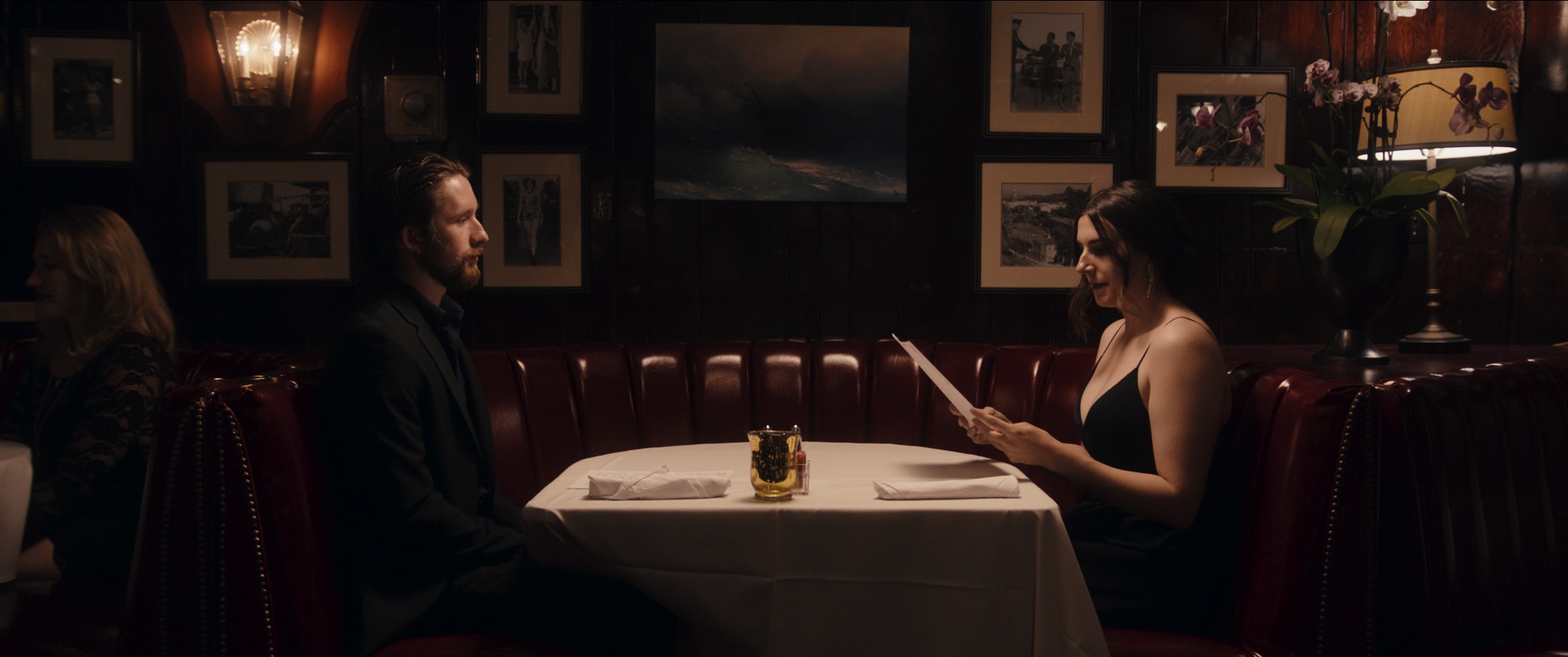Never Any Blue follows the story of an A-list actor and describing the events as a train wreck is an understatement. A train wreck hit by a train is more like it. It may ultimately be too much for some, but the 93 minute film is so well done that you’re doing yourself a disservice if you don’t try to endure the downward spiral.
It doesn’t take long to start the descent. Inside his darkened limo, Byron McCabe (Charles Curtice) is downing a whiskey, and there’s no bubbly sentiment despite the crowd cheering for his appearance. Nowhere near sufficiently numbed, the actor exits, and with only the flashing lights of the cameras, Curtice has no problem conveying the weight.

Completely zoned out at the movie premiere, the accompanying musical drone reinforces the point, and the notes aren’t the only indicator. The pouring of the poison, click of the ice and the glass always meeting a hard surface with a resounding clarity, we understand drink is an antagonist that Byron cannot escape.
So changing venues, the drinks are again on the house, and alone against the expansive L.A. backdrop of his picturesque home, it’s not just the emptiness, hopelessness comes across. You need to know, what happened to this guy?
Or more accurately, what did this guy do? But first, night gives way to day and finally seeing his face fully illuminates Byron’s broken soul. He also gives new meaning to the strong silent type, but far from strong, Curtice’s performance captures the essence. He doesn’t have the energy to counter the all-encompassing pain, and his economy of words lets us know like a collapsing sun.

The curtness also cuts off any chance to reach him. At the same time, his incredible Midwestern politeness begs that his victims try to understand how powerless he is.
Nonetheless, the impetus of all this is an “incident” that has brought life altering circumstances, and given the guilt that Curtice so effectively wears, Byron must have played a significant part.
We learn the specifics when Byron meets with his medical doctor. Going over the aftermath of a car accident, Dr. Abbot (Circus-Szalewski) obviously isn’t too worried about the minor abrasions that are healing.

He can read the degrading liver samples. The doctor’s attempts to counsel – maybe not so great. With a passive aggressive bedside manner, Circus-Szalewski lays out the facts, and his clumsy attempts at humor doesn’t help. But the doctor also knows he’s fighting a losing battle, and in tandem with the resigned reactions from Curtice, the actor’s delivery torpedoes the hopelessness right though the fourth wall.
Of course to Dr. Abbot’s credit, he understands the limits of his qualifications. So he recommends a psychologist. Deaf ears at first, another night of solitary binge drinking has Byron taking up his doctor’s orders, and enter Dr. Miranda Abbot (Kendall Stillman-Riddle)
Abbot’s daughter, the outset is not very fruitful. She does the standard introductory dance, and with the apprehensive, disdain that Curtice oozes, Byron ain’t buying.

Fortunately, Miranda is also pretty unconventional and through a mix of personal and professional intervention, she begins to break down Byron’s wall. Maybe not to the approval of the American Psychological Association, Stillman-Riddle masks her psychological intentions into a conversational trap and Byron falls into it.
Shamed, he can’t help go along and healing becomes possible. Up-ticking, Byron still has plenty of snark, and continues to probe and prod like he’s got a psychology degree too. Knowing the tricks of the trade, Miranda rolls with his punches, and the way the actress stays a step ahead provides reality to their budding relationship.
In accompaniment and for the first time, the cinematographic lighting no longer frames Byron in silhouette. But the transformation is kept to a minimum and the laid back tone of a measured Indie rock song tempers our hope.

Much needed, all this does not take place in a vacuum. Byron is a celebrity, and there are newspapers to sell. So a gossip columnist named Geoffrey Wright (Austin Gold) does the honors.
Completely unscrupulous, he’s not in it for anything as noble as holding Byron accountable for his actions. The reporter has made a name for himself and doing the bidding of those who relish in the pain of celebrities cements his power base.
As for Gold, he delivers the unseemly character by doing his own psychological gymnastics. Like the actor left his conscience at the door, the effect is compounded by the accent mastered by his Southern California upbringing. Coldly British, he’s among the best of all those calculating English villains who singe with the sound of their duplicitous lilt.
Still, the reporter pales in comparison. This especially when the second train arrives, which probably intends to send a message. Redemption, revenge, or just desserts, that’s up to the viewer – but either way, it’s going to hurt.


